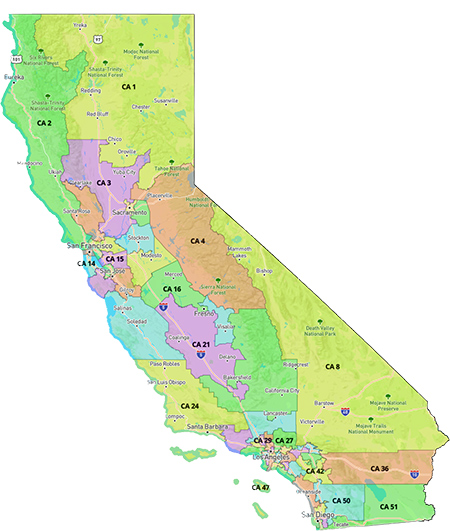Nov. 29, 2018 — The 2018 House election cycle is finally drawing to a close, and it looks like the Democrats are gaining their 40th conversion seat. Monday night in California, as the state’s marathon vote counting process meanders on, Democratic challenger T.J. Cox overtook Rep. David Valadao (R-Hanford/Bakersfield) and may well be headed toward victory.
Rep. Valadao, who had earlier been projected as the winner, trails his opponent by 438 votes, but the counting is still not complete. New votes were counted in Kern County that greatly favored Cox, allowing him to take the lead for the first time.
The California counting system literally takes weeks because the state allows voters to postmark their mail ballots on Election Day, and the counties only process ballots on certain days. The 21st District is split among four counties, so it is difficult to know exactly how many mail, overseas, and provisional ballots still remain since the numbers are only released by complete county domain.
It is probable that we will not have a final result until next week because Kern won’t release more totals until Monday. The remaining counties: Fresno, Kings, and Tulare, should record their final numbers this week.
The political overtime counting has clearly favored Cox since the beginning, as it has for all Democrats, particularly in California. If this trend holds, and it likely will, a Cox victory would give the Democrats a sweep of the seven Golden State targets and provide them a new delegation split of an incredible 46-7 over Republicans.
Though the 21st favors Democrats – they have a 43-27 percent registration advantage over Republicans with 25 percent declaring as Independents (No Party Preference) – Valadao has won a pair of 57 percent victories in his last two elections. Just before filing, Cox, a Fresno agri-businessman who was originally running against Rep. Jeff Denham (R-Turlock/Modesto), moved into the 21st just before the deadline in order to oppose Valadao. The unorthodox move worked as Democrats defeated Denham with challenger Josh Harder, and now look to have upended Valadao, as well.
Elsewhere, Utah Rep. Mia Love (R) officially conceded her race to Salt Lake County Mayor Ben McAdams (D) in another race where political overtime produced a seesaw counting process. On election night, it appeared that McAdams was headed to victory, as his lead over Rep. Love came close to a 9,000-vote spread; but she was able to come all the way back to forge ahead last week as the Utah County and rural counties’ votes were fully tabulated.
However, the last batch of Salt Lake County ballots allowed McAdams to re-establish his edge and the final count, certified Tuesday, gives him a 694-vote victory among 269,234 total ballots cast. The margin only fell 22 votes beyond the equivalent margin to trigger an automatic recount, but the spread is enough for Love to throw in the towel.
In New York, Democratic challenger Nate McMurray also conceded his race to indicted incumbent Rep. Chris Collins (R-Clarence/Batavia). This was another contest that had been called, but the political overtime counting was lessening the victory margin. The final total has Collins winning with a 2,560-vote margin, or a 49.4 – 48.5 percentage spread.
Assuming the Cox-Valadao trend holds for the Democrat, and it likely will though the 438-vote margin could conceivably get even closer, the Democrats will have gained 40 seats nationwide, taking the new House partisan division to 235D – 200R. This would clearly cement a new Democratic majority and force the Republicans to take back a minimum of 18 seats in the 2020 election to re-gain the House majority.
In all but one of their seven California conversions, the Republican incumbent or candidate led the Election Day vote only to see the lead spin toward the Democratic candidate once the millions (statewide) of mail votes were finally counted. Though all but the 21st District congressional race has been called, the state is still showing that an aggregate of 697,851 ballots remain to be counted in their marathon reporting process.

